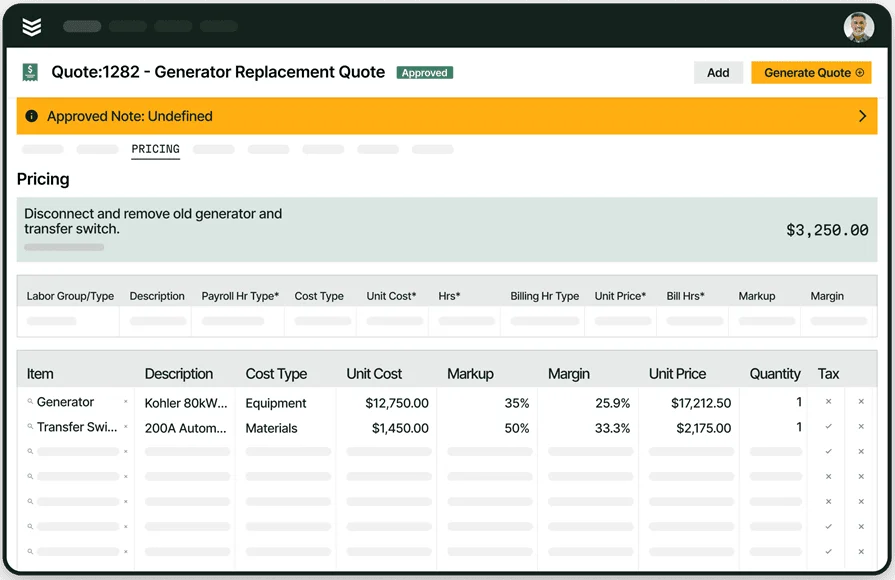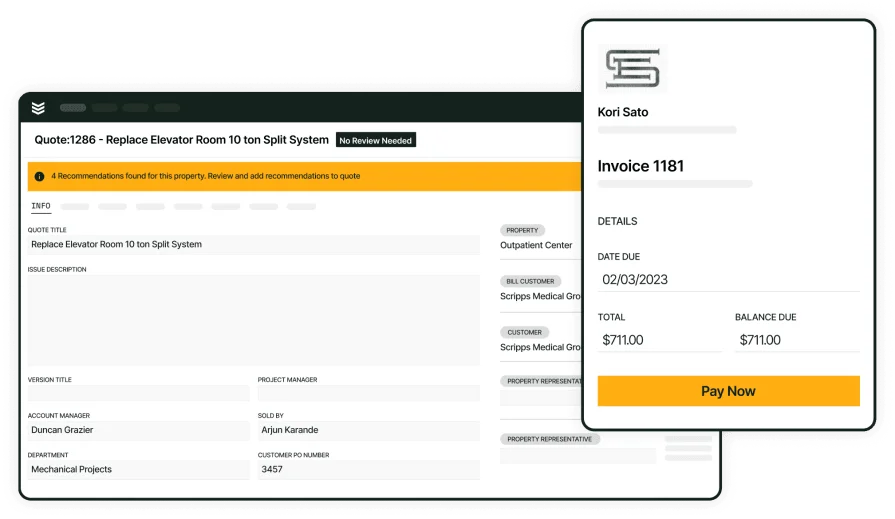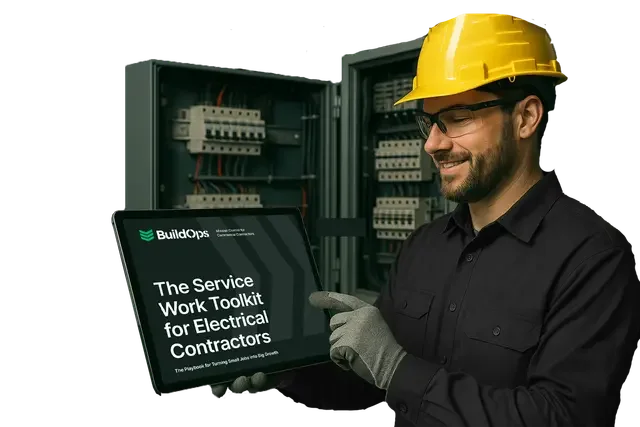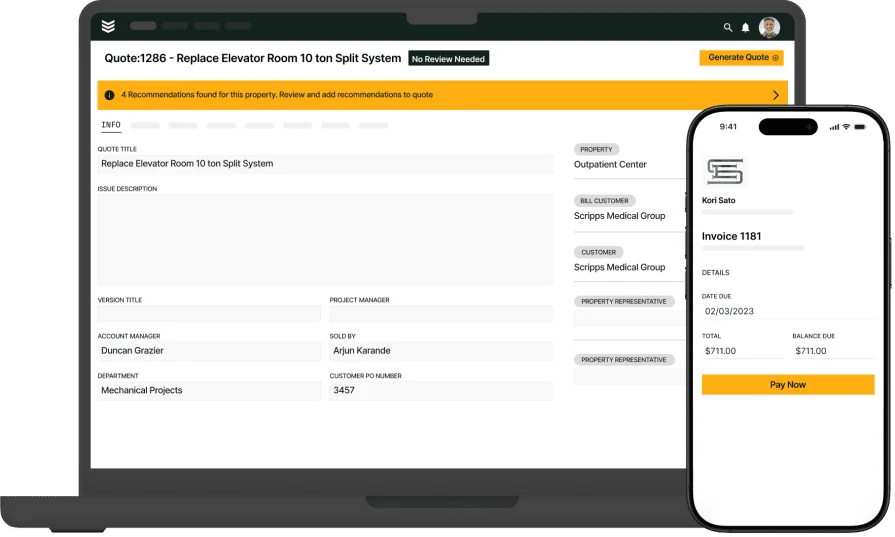Building accurate estimates has always been one of the toughest parts of running an electrical contracting business. Bid too low and you’re eating the cost. Bid too high and you lose the job. Navigating this balancing act takes sharp estimating—and that’s where an electrical estimating app becomes essential.
With the right tool, electricians can quote jobs quickly and confidently right from the field. Whether you're planning panel upgrades, wiring a new commercial build, or bidding on complex tenant improvement projects, precision is what keeps your jobs profitable. Estimating apps designed for the electrical industry help you nail labor, materials, and permits—all while reducing costly mistakes. In this guide, you’ll get a full breakdown of electrical estimator apps, including:
- Choosing the right electrical estimating app for your team
- 6 key features to look for in an electrical estimator app
- Types of electrical estimating apps
- 7 best electrical estimating apps for different contractors
- 7 benefits of using an electrical estimating app
- 4 important electrical estimate app FAQs answered
Consider your team's workflow compatibility first when choosing an electrical estimating app. Before looking at features, let's discuss key factors in selecting the best estimation software for you.
Choosing the right electrical estimating app for your team
Every job kicks off with an estimate. Get it right, and you protect your margins while staying competitive. Get it wrong, and you're either underbidding or pricing yourself out of work. For electrical contractors handling service jobs in the field, accuracy matters. Your crew needs tools they can trust while standing in front of a breaker panel, running conduit, or pricing out lighting upgrades. That’s where an electrical estimating app makes the difference.
An electrician estimate app gives your field techs the power to build detailed estimates on-site, adjust pricing for real-world conditions, and lock in quotes while standing with the customer. But not every electrical estimator app delivers the same performance. Before committing to a solution, here’s what to evaluate:
- Ease of use - Can your techs build estimates on-site without needing extra training? Does it take longer to fill out the app than jotting down numbers on paper? Is the interface simple enough for anyone on the team to learn fast?
- Field mobility - Can estimates be created, updated, and sent directly from a phone or tablet? Will the app function in real-world conditions like basements, job trailers, or commercial sites? Is job data accessible wherever your team works?
- Integration with existing systems - Does it sync with your current scheduling, invoicing, and job tracking software? Can approved estimates automatically generate work orders without re-entry? Does it help streamline your full job flow from quote to payment?
- Pricing flexibility and accuracy - Can you update labor, materials, and markups as job specs change? Does it pull live pricing from suppliers or your custom material lists? Can you adjust for client requests and last-minute scope changes?
- Features - Does the app offer templates, auto-calculations, and instant digital approvals? Can it handle both residential service calls and full commercial projects? Does it capture everything—signatures, photos, notes—in one place to avoid extra steps?
Forget rapid quotes; choosing the right electrical estimating app empowers your entire business with enhanced control over every bid. We will next explore the essential functionalities within top-tier electrical estimating applications.
6 key features to look for in an electrical estimator app
An electrical estimating app should do more than just calculate a number—it should serve as a tool your techs depend on every time they quote a job. In the electrical trade, estimating isn’t just about parts and labor. You’re dealing with fluctuating material prices, complex code requirements, tight job schedules, and customers who expect fast, accurate quotes right on-site.
The right app helps you build reliable bids, keeps your team efficient, and gives your business an edge in winning contracts.
1. Scheduling and dispatch integration
Keeping your crew organized starts with having your estimating tied directly into your field service scheduling and dispatching system. This ensures that once a job is estimated and approved, it immediately gets assigned to the right tech with no extra paperwork. Take for example a contractor estimating a commercial panel upgrade for a retail space. Once the bid is accepted, the job automatically moves into the schedule, assigning the right crew based on availability and skill set—no more phone calls or lost work orders.
2. CRM and customer data management
An electrician estimate app should integrate with your customer management tools, making sure your entire customer history is tied to each estimate. Past service records, preferences, and even site-specific notes all help build more accurate quotes. For instance, when quoting a lighting retrofit for a property manager who owns multiple buildings, having instant access to previous work orders helps your estimator include required upgrades and avoid duplicate work that was already done.
3. Fleet and technician location tracking
Your electrical estimator app should factor in technician availability and vehicle status through built-in fleet tracking. This allows you to account for travel time, fuel costs, and ensures your techs are dispatched efficiently for approved estimates. Let’s say a tech is finishing up a service call nearby. With live fleet tracking, you know exactly who can respond to an urgent tenant fit-out request without wasting hours crisscrossing town.
4. Invoicing and payment integration
A seamless transition from estimate to invoice helps keep cash flow steady. Your app should sync with your invoicing and payment processing tools so that approved quotes can instantly generate invoices and collect deposits or full payments on the spot. As an example, after quoting a subpanel relocation, the customer approves the estimate. The system immediately generates an invoice, allowing payment to be processed before your crew even leaves the job site.
5. Mobile access for field technicians
Since most estimates happen on-site, your electrical estimate app must give your techs full mobile capability through a technician mobile app. They should be able to build, edit, and send estimates without returning to the office. Picture a service tech troubleshooting a parking lot lighting issue. Instead of scribbling notes and calling the office, they update the estimate from their tablet, accounting for lift rentals, labor, and materials—all while standing under the pole.
6. Reporting and job costing analytics
A strong electrical estimating app should give you access to reporting tools that track job costs, margins, and win rates. This data helps you adjust pricing models, improve bidding accuracy, and stay profitable long-term. For example, after multiple transformer upgrades, you notice that labor hours consistently run higher than estimated. The system flags these trends, helping you adjust future bids to reflect true job demands.
Other notable features of electrical estimating apps
While the core functions handle the heavy lifting, some additional features inside an electrical estimating app can bring even more efficiency to your estimating process. These extra capabilities may not be deal breakers, but they can help fine-tune your quoting accuracy, keep your business organized, and offer extra convenience for both your office staff and field techs.
- Service agreements management - A built-in service agreements tool allows electrical contractors to easily manage ongoing maintenance contracts and recurring services directly within the estimating platform. This helps your team apply contract-specific pricing, discounts, or pre-negotiated labor rates automatically when building estimates for long-term customers.
- Pipeline and opportunity tracking - An integrated pipeline management system helps track open bids, pending approvals, and project opportunities across your sales funnel. Electrical contractors can monitor which estimates are still open, which ones have been accepted, and which need follow-up to keep jobs moving forward.
- Time tracking for labor accuracy - With time tracking features, your estimates can become even sharper by analyzing actual labor hours from previous jobs. This helps you better predict crew time for similar future projects, reducing the risk of underestimating labor costs on complex wiring, panel upgrades, or large-scale installations.
Selecting an electrical estimating app with a robust feature set can significantly improve your team's accuracy, speed, and overall organization. However, the ideal app isn't one-size-fits-all. The most suitable format will vary based on your company's scale, the nature of your projects, and your field team's operational style. Let's explore the different categories of electrical estimating applications available.

Estimate jobs with precision
Provide accurate estimates that keep jobs moving and make invoicing a breeze.
Types of electrical estimating apps
Electrical estimating apps come in different formats, each built to fit the daily demands of electrical contractors and field service teams. The type of app you choose depends on where your team works, how estimates are handled, and how connected your systems need to be. Here are the three main types:
- Desktop software - Installed directly on office computers, desktop-based electrical estimator software offers detailed job costing, material management, and financial reporting tools. This setup works best for businesses that handle most estimating work from the office, with staff building bids from a fixed location while managing larger commercial contracts and longer bidding cycles.
- Cloud-based solutions - Cloud-based electrical estimating apps store all job data online, allowing your entire team—from field techs to office staff—to build, edit, and send estimates from any device with internet access. These solutions work well for contractors running multiple crews across different job sites who need real-time access to estimates, project updates, and collaboration tools without being tied to one location.
- Mobile estimating apps - Built for field technicians, mobile electrical estimate apps give your team the power to build and send quotes while standing directly in front of the job. Whether adding circuits, troubleshooting service panels, or quoting tenant improvements, mobile apps make it easy to adjust labor, materials, and pricing on the spot. While these apps are great for quick, on-site estimating, some may not offer the deeper reporting or financial tools found in full desktop or cloud platforms.
Each option serves a specific purpose depending on how your team operates. Whether you're building large-scale bids from the office or giving your techs the ability to quote jobs on-site, the right electrical estimating app keeps your team efficient, competitive, and profitable.
7 best electrical estimating apps for different contractors
Having the best electrical estimating application can revolutionize your company's quoting process, cost management, and overall success in securing contracts. The most effective solutions empower electrical professionals to generate swift, precise estimates while seamlessly connecting with all facets of their field service operations. Regardless of your specialization—be it extensive commercial projects, residential services, or a blend of both—there exists a tailored application to meet your specific requirements.
Explore this curated list of seven leading-edge apps meticulously designed to keep electrical contractors at the forefront of their industry.
1. Best for commercial contractors: BuildOps
BuildOps is designed specifically for commercial electrical contractors, giving teams an all-in-one electrical estimator app that simplifies estimating for complex, large-scale projects. From takeoffs to detailed proposals, it delivers accurate, professional estimates while connecting seamlessly to scheduling, invoicing, and job costing tools. Every piece of the estimating workflow stays fully integrated so your entire operation works from one system. This level of connection makes it ideal for contractors managing multiple crews and high-volume bidding.
How pricing works: BuildOps offers custom pricing based on company size, scope, and operational needs, allowing contractors to only pay for features that support their estimating and field service workflows.
Features beyond estimating:
- Real-time tracking of job costs and profitability
- Automated labor and material calculations for precision bids
- Seamless integration with scheduling and invoicing to keep operations fully connected
What sets it apart for commercial: BuildOps handles the full complexity of commercial estimating with tools that simplify bid creation, automate pricing, and sync with the rest of your field service management tools. Whether quoting for a new electrical service upgrade or a multi-unit tenant improvement, BuildOps helps teams create consistent, winning bids.

Give BuildOps a Try
Streamline project management from the first quote to the final invoice.
2. Best for residential contractors: Housecall Pro
Image Source: Housecall Pro
Housecall Pro offers residential electrical contractors an easy-to-use platform for estimating, scheduling, and customer communication. Small service teams can quickly generate quotes, adjust pricing, and send estimates directly to homeowners without delays. The simple interface helps technicians build bids while on-site, but Housecall Pro may lack the advanced job costing and reporting tools required by contractors handling larger commercial or multi-phase electrical projects.
How pricing works: Housecall Pro uses tiered pricing plans, giving businesses flexibility to choose based on team size and features needed.
Features beyond estimating:
- Built-in scheduling and dispatching tools
- CRM features for managing customer records
- Mobile app for creating estimates on-site
What sets it apart for residential: Housecall Pro focuses on speed and simplicity for smaller residential jobs, making it easy for contractors to send estimates, schedule service, and manage customers—all from a mobile device.
See how Housecall Pro compares to BuildOps in our feature comparison here.
3. Best for general contractors: Jobber
Image Source: Jobber
Jobber works well for electrical businesses that handle both residential and light commercial projects. It provides a straightforward interface for creating estimates, tracking jobs, and managing client relationships. With a focus on field service companies, Jobber simplifies estimating across a variety of service types, but may not deliver the advanced estimating depth or commercial-level integrations needed for larger electrical operations.
How pricing works: Jobber offers flexible pricing based on user count and selected features, making it accessible for small and mid-sized businesses.
Features beyond estimating:
- Custom estimate templates for multiple job types
- Automated follow-ups to help close more bids
- Mobile accessibility for field technicians
What sets it apart for general: Jobber balances affordability with functionality, offering electricians a reliable tool that handles quoting, scheduling, and customer management without unnecessary complexity.
4. Best for blueprint takeoffs and material counts: STACK
Image Source: STACK
STACK gives electrical contractors who work heavily off blueprints a powerful tool to perform fast, accurate takeoffs and material counts. It allows teams to measure conduit runs, panel layouts, lighting grids, and circuit lengths directly from digital plans. This simplifies bid preparation for large-scale commercial and multi-family projects. However, STACK may not fully meet the needs of electrical service contractors who require field-friendly estimating and broader job management functions.
How pricing works: STACK offers subscription-based plans depending on the number of users and features needed, with a free trial available.
Features beyond estimating:
- Cloud-based blueprint measurement and quantity takeoffs
- Preloaded electrical material databases
- Proposal creation tools for professional bid submissions
What sets it apart for blueprint-heavy jobs: STACK helps electrical contractors working on large new builds or tenant improvements quickly translate digital blueprints into accurate material lists and pricing.
5. Best for small service teams needing simple workflows: Estimate Rocket
Image Source: Estimate Rocket
Estimate Rocket provides electrical service contractors with a fast, easy-to-use platform for generating quotes, managing projects, and invoicing—all from one system. Its simple workflows allow smaller teams to handle multiple estimates, customer approvals, and job follow-ups with less admin work. However, contractors handling complex multi-phase or large commercial jobs may find its estimating features too limited for highly detailed bids.
How pricing works: Estimate Rocket uses a monthly subscription with pricing tiers based on user count and included features.
Features beyond estimating:
- Job tracking and simple project management
- Automated customer communication and follow-ups
- Mobile estimating capability for field techs
What sets it apart for service teams: Estimate Rocket helps smaller electrical businesses quote and manage service jobs quickly, reducing paperwork and speeding up job approvals.
6. Best for businesses prioritizing QuickBooks integration: FieldEdge
Image Source: FieldEdge
FieldEdge is ideal for electrical businesses that want to keep estimating fully connected with accounting. With direct integration to QuickBooks, FieldEdge eliminates manual data entry between your estimates, invoices, and financials. It also offers real-time inventory pricing, service history, and dispatch tools. However, larger commercial contractors may find FieldEdge lacking in advanced estimating features for multi-system or high-volume bidding.
How pricing works: FieldEdge offers subscription pricing customized by business size, features, and number of users.
Features beyond estimating:
- Complete service history tied to each customer
- Live pricing updates for materials and inventory
- Direct integration with accounting, invoicing, and scheduling tools
What sets it apart for accounting-focused businesses: FieldEdge simplifies financial tracking by directly connecting every estimate to your accounting software, reducing errors and reconciling jobs with your books in real-time.
7. Best for complex industrial and specialty bids: Trimble Accubid
Image Source: Trimble Accubid
Trimble Accubid delivers detailed estimating power for contractors handling highly complex, industrial, or large commercial electrical projects. Its deep material and labor databases, advanced cost factoring, and integration with design and BIM systems make it ideal for contractors bidding on multi-million-dollar jobs. However, its complexity and cost may be unnecessary for smaller contractors focused on service work or simpler projects.
How pricing works: Trimble Accubid operates on enterprise-level pricing, customized to company size, software modules, and user licenses.
Features beyond estimating:
- Extensive databases for electrical materials and labor factoring
- In-depth reporting and detailed financial analysis tools
- Integration with BIM, CAD, and procurement platforms
What sets it apart for complex projects: Trimble Accubid gives electrical contractors the ability to produce highly detailed bids for major infrastructure, industrial plants, and large-scale electrical design projects.

Level up your operations
Get access to top strategies and processes, real-life examples, and templates.
7 benefits of using an electrical estimating app
A strong electrical estimating app does far more than calculate totals. For field service contractors, it becomes a daily tool that drives accuracy, speed, and stronger margins. Beyond just building estimates, these apps help electrical businesses stay organized, deliver better customer experiences, and win jobs faster.
Here are seven real-world benefits electrical contractors gain from using an estimating app built for the work they do every day:
1. Faster estimates to win jobs quicker
The longer it takes to send a quote, the more time your competitors have to step in. With an electrical estimating app, your techs can create complete bids on-site, eliminating follow-up delays. This is especially critical when working on competitive service calls or tenant improvements that require immediate pricing. Many contractors use an electrical contractor bidding app to ensure estimates go out quickly and help secure approvals before the customer shops elsewhere.
2. Reduced errors and tighter job costing
Small mistakes in labor hours or material counts can easily chip away at your profits. By using real-time calculations inside an electrician estimate app, contractors avoid common estimating errors while keeping bids consistent across the entire team. Tying labor rates and material pricing into one system helps ensure job costs reflect actual work required.
3. Easier client management with complete customer history
Every customer interaction—whether it’s a panel upgrade, generator install, or service call—can be tracked and attached to the estimating process. An integrated CRM for electrical contractors gives your team instant access to prior work, site-specific notes, and customer preferences, helping build more accurate bids that reflect real site conditions.
4. Simplified scheduling after estimate approvals
Once an estimate is approved, the job should flow straight into your work calendar without extra admin work. An electrical estimating app that connects with an electrical contractor scheduling app allows your dispatcher to assign techs immediately, minimizing downtime and keeping crews booked and productive.
5. Seamless coordination between office and field
With real-time updates from the field, office staff and dispatchers stay fully in sync. Using an electrical dispatch software, teams can adjust schedules, monitor job progress, and modify estimates as changes arise, even while work is already underway.
6. Stronger approval rates with clean, professional proposals
A well-built electrical estimator app allows you to generate branded, easy-to-read proposals that customers can review and approve electronically. This eliminates back-and-forth paperwork, improves the customer experience, and speeds up the sales cycle for both small service work and larger projects.
7. Improved bidding consistency across your whole team
When multiple estimators or technicians prepare quotes, pricing inconsistencies can occur. An electrical estimate app standardizes pricing models, labor rates, and templates across your entire operation. Many businesses adopt an electrical bidding app to ensure every bid follows the same format, keeps profit margins predictable, and builds confidence with both new and repeat customers.
4 important electrical estimate app FAQs answered
Electrical contractors rely heavily on accurate bids to land profitable jobs. Whether estimating for a quick service call or a large commercial project, using an electrical estimating app gives both field technicians and office staff the speed and precision they need. These apps play a major role in daily operations, so it’s natural for contractors to have a few key questions before adopting one. Here are some of the most common FAQs:
1. What is an electrical estimating app?
An electrical estimating app is a digital tool designed for electricians to create complete, accurate bids while on the go. It calculates labor, materials, equipment, and overhead costs based on real job data, ensuring every quote reflects current pricing and real-world project conditions.
Many apps also connect with scheduling, dispatching, invoicing, and CRM tools, giving contractors a fully integrated system to manage the full job lifecycle.
2. How does an electrical estimating app improve billing accuracy?
Manual estimating often leads to skipped costs, miscalculations, or missed material updates. With an electrician estimate app, all labor rates, materials, and pricing structures stay consistent across every bid. Real-time updates ensure material prices reflect supplier changes, while built-in calculations reduce the risk of underquoting or leaving profits on the table.
Did you know
See how our customer Jolma Electric saw a 50% spike in efficiency after using BuildOps.
3. Who should use an electrical estimator app?
Electrical business owners, sales teams, project managers, and field technicians all benefit from using an electrical estimator app. Whether quoting service work, tenant improvements, or large-scale installations, these apps help standardize pricing, improve team-wide consistency, speed up approvals, and reduce costly administrative errors across the entire operation.
4. What are some best practices when using an electrical estimating app?
A well-implemented electrical estimate app works best when your entire estimating process stays organized, consistent, and easy for your entire team to follow. Contractors who stick to these proven best practices get better results, stronger margins, and more accurate bids across every project:
- Keep material pricing updated regularly to reflect supplier changes
- Review labor rates and markups quarterly to maintain profitability
- Build standard estimate templates for common services and projects
- Train both office staff and field techs to build and edit estimates confidently
- Use digital customer approvals to eliminate paperwork delays
- Integrate your estimating app with scheduling, dispatch, and invoicing tools
- Apply consistent pricing structures across all job types
- Track job costing data to compare estimated vs. actual costs
- Review past estimates to refine pricing accuracy for future bids
- Back up estimate data regularly to prevent information loss
For electrical contractors, getting estimates right means protecting profit margins while staying competitive on every bid. The best electrical estimating apps give your team the ability to build accurate quotes quickly—whether they’re standing onsite or managing projects from the office. From small service calls to multi-phase commercial installs, having one system that ties estimating into scheduling, dispatch, invoicing, and customer management helps eliminate mistakes and keeps jobs moving smoothly.
For contractors managing larger commercial field service operations, platforms like BuildOps bring everything together—combining estimating with full job management, scheduling, dispatch, and invoicing—all inside one system built for the complexity of commercial work.

Take a closer look
We help electrical contractors estimate more accurately so jobs run smoothly.







